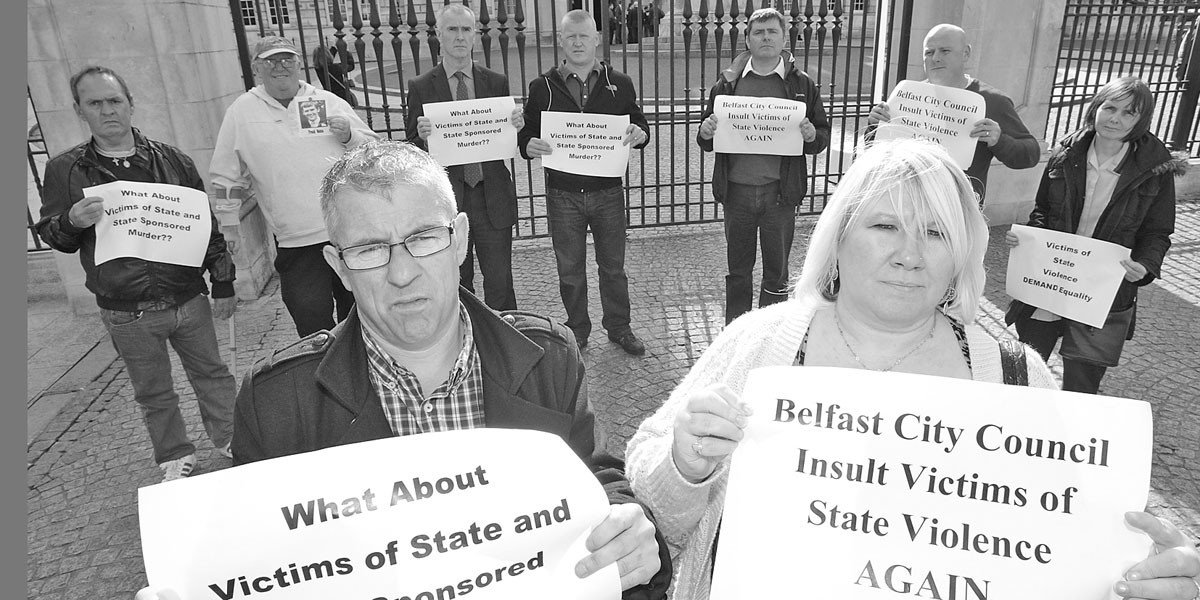RELATIVES of people killed and injured by British soldiers and the RUC during the conflict are preparing to launch a legal action against a proposed “memorial” to Operation Banner at Belfast City Hall.
Operation Banner was the operational name for the activities of the British Army and RUC in the North, beginning with the arrival of troops in 1969 and only ending officially in 2007. Immediately following the end of Operation Banner, Belfast City Council passed a unionist motion to construct a “fitting memorial” to those “servicemen and women” involved.
The proposal was placed on the back burner for over five years – until this week when the Council announced a consultation process with victims’ groups to decide upon a final memorial.
However, the plan to honour members of British regiments, the UDR and the RUC has sparked anger among those whose loved ones were killed by soldiers and RUC members acting under Operation Banner. They are now seeking legal advice on their next move, including a possible injunction to prevent any memorial from being erected.
Council staff are considering Operation Banner memorial ideas ranging from a refurbishment of the three exisiting tributes to state forces to a £55,000 bronze statue. But Mark Thompson, Director of Relatives For Justice (RFJ), has blasted the Council for offering a consultation after the plans have been drawn up.
“For many citizens of Belfast – in all its four corners – Operation Banner means the opposite of law and order and certainly not the maintaining of peace,” he said.
“For these citizens Operation Banner means murder, grievous injury, internment, torture and collusion with loyalism, all with the cloak of impunity. We will be meeting with the Equality Commission on this issue and we will also be seeking legal advice on a possible injunction if it is to go ahead.”
Victims held a protest at the gates of City Hall yesterday. In attendance was Jacqueline Butler, whose father, Patrick Butler, was killed by British army snipers during the Springhill Massacre of 1972.
“I would be horrified to see any statue or anything else to Banner troops at City Hall,” she said. “My dad was an innocent man shot dead when I was only 15 months old. We never even got an apology and now they want to have a tribute to his killers in the city centre?”
Teresa McTasney’s sister, Martha Campbell, was just 13 when she was slain while walking along Springhill Crescent by gunmen believed to be from the UVF, a group which colluded regularly with UDR members.
“Hearing this proposal has brought it back to us, and it’s sickening to think that collusion will be ‘honoured’ in this way,” she said.
Stan Carberry’s father, Stanislaus, was 34 when he was shot dead by the British Army as he exited a car which crashed on the Falls after soldiers opened fire on the vehicle.
“If the Council go through with this, it will be a total insult to all of us whose families have suffered at the hands of the British Army and the RUC,” he said.
Others attending the protest included Sean Tumelty, permanently injured by a plastic bullet fired by soldiers in 1981, and Pat Quinn, whose 19-year-old brother was gunned down by Paratroopers during the Ballymurphy Massacre.
Mark Thompson added: “We will be seeking meetings also with all parties represented on the Council over this issue. It’s time the Council thought about a memorial which recognises all those killed or injured in the conflict and brought an end to this policy of selectivity which highlights some losses and ignores others.”
A spokesman for Belfast City Council said: “The issue will be discussed at the October meeting of the Strategic Policy and Resources Committee. It would be inappropriate for us to comment before then.”






